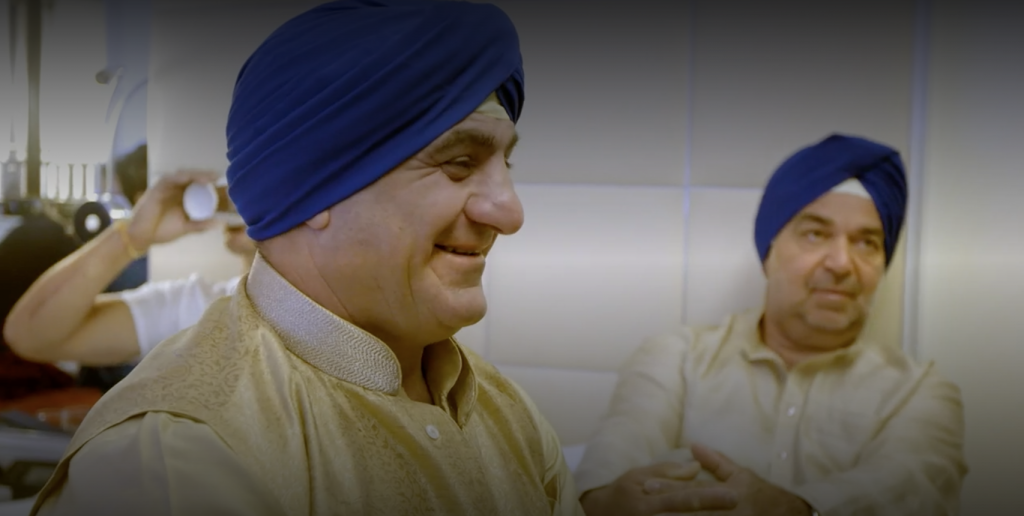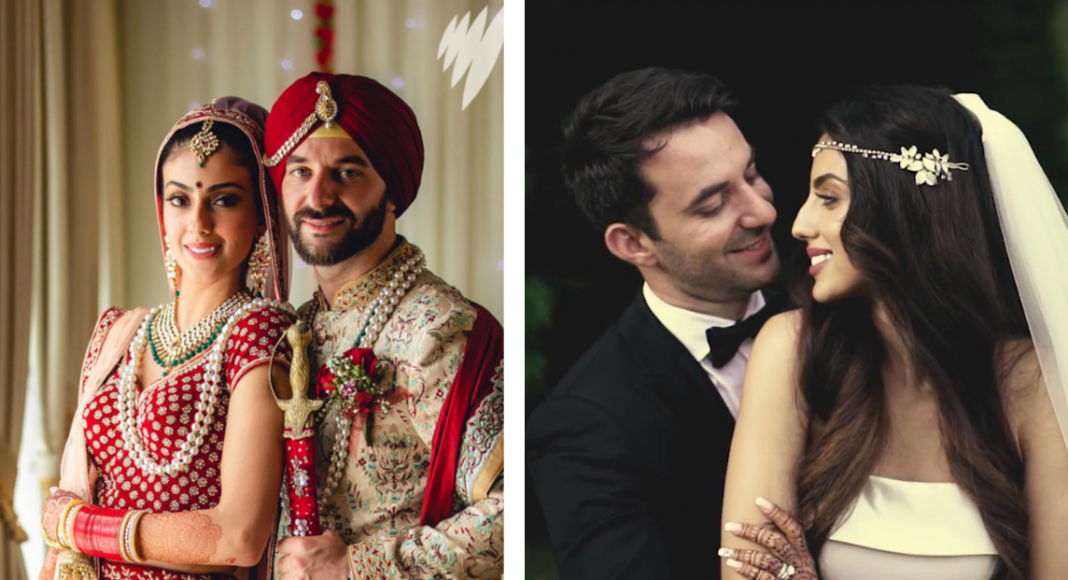When George Kantzios and Ranmeet Jassal decided they wanted to spend the rest of their lives together, they agreed that no external factors should stop them from doing so. Especially not the fact that George was raised a Greek Orthodox Christian, and Ranmeet was raised a Sikh-Punjabi.
“Religion’s a touchy subject…at the end of the day you’re pretty much born into it, so I don’t see why it should get in the way so much. It’s not your fault where you’re born. It’s almost demographic…it shouldn’t stop you,” said 28-year-old construction manager, George, to The Greek Herald.
George was working in Malaysia and met Ranmeet in Kuala Lumpur, where she was completing her first-year of medical school. Within 6-months of meeting, the couple knew they had found something special, and with that realisation, dawned a lot of difficult decisions that needed to be made.
The obstacles the couple have faced have only strengthened their ability to communicate and compromise in a transparent, respectful and mutually beneficial manner.
Their first decision as a future married couple was that Ranmeet was going to move to Australia and restart her career as a doctor over here.
Then, came the decisions about the wedding, which is what inspired SBS documentary series ‘Marry Me, Marry My Family’ to contact them and air their story.
A Greek upbringing matched with a Sikh upbringing
Both Ranmeet and George love the religions and cultures they were born into, and didn’t see that it was fair for either of them to have to completely abandon their traditions. This is why they decided they were going to get married in both a Greek Orthodox Church in Melbourne, and a Sikh temple in Malaysia.
“When you’re born into a religion, you see the same wedding over and over again. So in your head, you only know getting married being in the church, cause that’s all you’ve seen. If you grew up and every wedding was in a garden, you’d imagine yours would be in a garden. That’s how it is. My wife always saw it in a temple, so that’s what she wants. I’ve always seen it in a church. We might not be overly religious, but if that’s all you’ve ever seen, that’s all you’re ever going to want,” explains George to The Greek Herald.
George’s upbringing was very similar to most Greek’s born in Australia, who sought inspiration from traditional migrant rules.
When George is first introduced on the SBS documentary, his father says “it was very important to us that he knows what it’s actually like to be Greek”. George’s childhood was filled with Greek school, Greek dancing and constant exposure to Greek community events.
With George’s entire ancestral history having married Greeks, he too was raised with the idea of marrying a “nice Greek girl” – “It will be better and easier for you if she’s Greek. There won’t be issues with the culture and the religion,” George’s family would often reiterate.
George commended and thanked his family for their acceptance, understanding and open nature when he decided to marry Ranmeet.
“My family were really good about everything. Then when I started talking about the wedding and what my plans were, they were sort of like, if you’re going to get married in a Sikh temple it’d be nice if you kept up your traditions and married in the Greek church,” said George.
“If I married a Greek it would be a bonus…given that it’s easier, but for me it wasn’t the be all and end all.”
Ranmeet, who grew up in Malaysia was raised as a “very traditional” 4th generation Punjabi Indian.
“I never thought I’d be walking down the aisle and wearing a white gown,” she says in the documentary series. “As a daughter I don’t want to upset my parents, and I just wanted their blessings.”

Two big fat Greek-Sikh weddings
When it was decided that the pair were going to have two weddings, the biggest complication that arose, according to George was organising two weddings that had such high calibre religious and cultural traditions.
A traditional Sikh wedding has 4 events that lead up to the wedding, with a traditional ceremony and reception.
On George’s part, he decided to adopt a Sikh name to do something for his wife, since she would have to convert to Greek Orthodoxy for him. Though, technically George has not converted his religion.
“What’s happened is, Sikh’s allow mixed marriages in the temple. So, what I did was, I just got a name. They gave me a Sikh name. Some don’t mind, you can just go as you are. If you look at it like that, Ranmeet’s technically converted to Greek Orthodoxy, and her temple allows the marriage,” George explains to The Greek Herald.
“Technically, we’re both Orthodox…The name conversion was for me to do something on my side,” said George.
Ranmeet still considers herself Sikh and is very close to her culture. This is why the couple have decided that, while they are technically Greek Orthodox Christians, they will still upkeep Sikh-Punjabi customs and traditions.
“I’m proud to be Punjabi. I’m proud to be Sikh. It makes me who I am. George has embraced Punjabi and Sikh religion, so I don’t feel like I’m leaving anything behind,” said Ranmeet on the documentary. “I’m embracing a new religion. I’m embracing a new culture. That doesn’t mean I’m not Sikh. I’m still Sikh inside.”
From the Greek Orthodox aspect, Ranmeet had to participate in a 12-week intensive course that would allow her to be baptised Orthodox. This was the only way she could get married in the Greek Orthodox church. The classes were run once a week, set with a full syllabus and 15-20 students per class.
Ranmeet and George had their classes, as well as Ranmeet’s baptism and their wedding at St Haralambos Church in Templestone, Victoria. They both attended classes with Father Antonio, and both highly commended his open-nature and wisdom throughout the entire process.
“He was a really open-minded priest. He spoke about all cultures, rather than just telling us that Greek Orthodox was the only way. His English is perfect, so he was the perfect match for us,” said George to The Greek Herald.
While George did not technically have to go to the classes, he wanted to support his wife throughout the process, and learnt a lot of things himself.
“We didn’t both have to go, but I wanted to go…I learnt a lot. We had religious studies in school, but you forget a lot of things. It’s good to hear it from someone so open. He touched on a lot of things. He touched on the history of Orthodoxy, and how it came about, and where it came from. He touched on little things that everyone usually steers away from. It was really good. He was fantastic,” said George.
“As we got into it more and more, it was more surprising for Ranmeet. She took it very seriously. It wasn’t just like a one day thing to get it out of the way. She took it all very seriously. It was a big deal,” said George.
Raising a family with two religions
When George was asked about the next steps, like raising a family, he said, “between ourselves, we sort of embrace both. We haven’t discussed too much yet, definitely something we’re going to have to cross. We’ll cross that bridge when we get to it.”
Though, he outlined a number of traditions that he would like to pass on to his children from both his Greek Orthodox upbringing, and Ranmeet’s Sikh-Punjabi upbringing.
“I’d like them to pick up the language, even though it’s not becoming as useful anymore. It’d still be nice to keep the language. Greek dancing…obviously we’d keep all the Easter and Christmas traditions going. As much it’s a culture thing…for us being Greek, I don’t think you’d want to miss out on that. I wouldn’t mind holding those traditions,” said George.
From Ranmeet’s perspective, he says, “she’s pretty easy going with the language, because she’s not very fluent in Punjabi herself. But she wouldn’t mind if the kids learnt a little bit so they could communicate. I think that’s important. Depending on what happens with religion, she still would like to go to the temple on the main events,” he said.
George explains that, from his understanding, they would celebrate holidays like ‘Vaisahki’, ‘Diwali’ and the major days for “gurus”, which George compares to major name days in Greek Orthodoxy. While also upkeeping Easter and Christmas traditions for Greek Orthodoxy.
George notes that after the show, he has been receiving hundreds of messages from people who are in the same position, asking him for advice.
“I think if I did give advice, it’d be to be a bit more organised than I was. Allow some time before you plan to get married to speak to the church, cause it takes a bit of time…That’s what made it a lot more difficult,” says George.
Ultimately, George and Ranmeet have adopted the mentality of the common sense behind religion, and its teachings on how to serve as a good human being.
“It’s not about what specific God or scriptures you believe in. There’s only one God and there’s a lot of common sense behind religion…Respecting others, not being selfish and being a good person,” said George.

